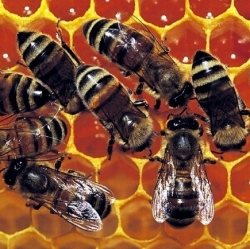
The European Commission has proposed that member states restrict the use of certain classes of pesticide that are believed to be harmful to bees. Sprays that use neonicotinoid chemicals should only be used on crops that are not attractive to the insects they said.
The sale of seeds treated with these chemicals should also be prohibited. Bayer, one of the companies who make the pesticides, says they are convinced they can be used without harm to bees.
Earlier this month, the European Food Safety Authority (Efsa) issued guidance on the use of neonicotinoids, in which they recognised "high acute risks" to bees who encountered residue from these sprays in pollen and nectar in crops like oilseed rape and sunflowers. They also said there were risks to bees from dust in crops like maize that had been sprayed with these pesticides.
Now the European Commissioner for health and consumer policy Tonio Borg has adopted the same line saying it was time for "swift and decisive action."
He has tabled a discussion paper that asks EU member states to restrict the use of neonicotinoids to crops not attractive to bees and to prohibit the sale and use of seeds treated with products that contain the active substances.
Three pesticides would be affected -clothianidin, imidacloprid and thiametoxam. Farmers would be banned from using them with sunflowers, oilseed rape, cotton and maize. Commission spokesman Frederic Vincent told BBC News the measure was based on the latest scientific advice.
"We have requested a proper scientific assessment of neonicotinoids from Efsa. They came up with some concerns, some kind of worrying assessment. So now we are saying to members we have some scientific evidence that there are some concerns from those pesticides and the effects they might have on bees," he said.
